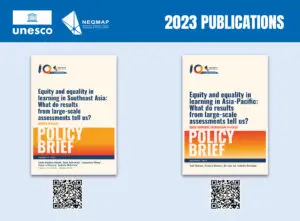Date and Location:
Wednesday 14th of June at 3:30pm – 4:30 pm (GMT+7/Bangkok time) via Zoom
Type of event:
Online Webinar
Registration link:
https://bit.ly/3WTS6ul
Presentation Brief:
IEA’s PIRLS (the Progress in International Reading Literacy Study) is the global standard for monitoring reading achievement at the fourth grade. PIRLS is the first published international assessment that successfully collected data during the COVID-19 pandemic, assessing 400,000 students in 57 countries.
PIRLS 2021 was the fifth assessment cycle marking 20 years of trends, and the transition to digital assessment. Approximately half the countries evaluated students using a state-of-the-art digital assessment with engaging and interactive reading assessment materials, including simulated online projects with multiple websites, videos, and navigational features such as links and pop-ups. PIRLS 2021 collected a considerable amount of information from school principals, parents, and teachers as well.
The five PIRLS trend assessments conducted to date resulted from close collaboration among the participating countries, involving thousands of collaborators internationally. IEA and Boston College remain committed to supporting countries in improving their education systems and ensuring that all students have access to high quality education. The report, PIRLS 2021 International Results, provides important insights into the current state of literacy education. It also serves as a fundamental resource for educators, policymakers, and researchers worldwide to monitor educational recovery from the COVID-19 pandemic.
Seven members of NEQMAP participated in PIRLS 2021. Their results will be emphasized today amongst the selection of international results.
Presenter:

Dr Dirk Hastedt is the Executive Director of the International Association for the Evaluation of Educational Achievement (IEA), leading its high-quality comparative research. He oversees operations, studies, and services, and drives the overall strategic vision. Prior to assuming his current role, he was Co-Director of the IEA Data Processing and Research Center (IEA DPC), where he was responsible for the center’s international research activities. Dr Hastedt has an in-depth knowledge of large-scale educational assessment, built on years of experience. Dr Hastedt is also the acting chair of IEA’s Technical Executive Group and Co-editor in chief of the IEA-ETS Research Institute’s journal, Large-Scale Assessments in Education. His Doctor of Philosophy in Education is from the University of Vienna.






